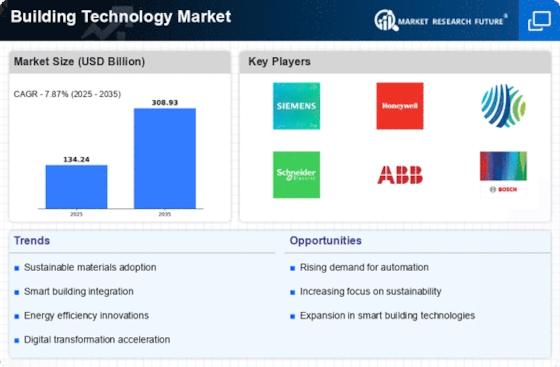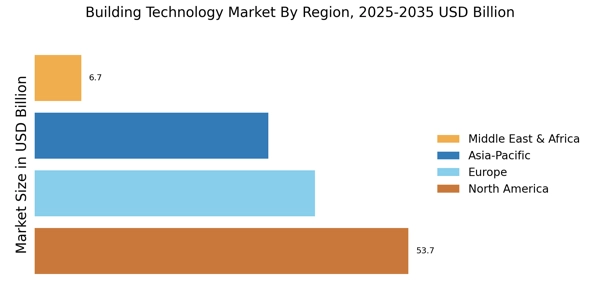Integration of Smart Technologies
The integration of smart technologies into the Building Technology Market is transforming how buildings operate. Smart sensors, IoT devices, and automation systems enhance energy efficiency and occupant comfort. According to recent data, the smart building segment is projected to grow at a compound annual growth rate of 25% over the next five years. This growth is driven by the increasing demand for energy-efficient solutions and the need for real-time data analytics. As more stakeholders recognize the benefits of smart technologies, the Building Technology Market is likely to see a surge in investments and innovations, leading to more sophisticated building management systems.
Sustainable Construction Practices
Sustainable construction practices are becoming a cornerstone of the Building Technology Market. With a growing emphasis on reducing carbon footprints, many construction firms are adopting eco-friendly materials and energy-efficient designs. The market for green building materials is expected to reach USD 500 billion by 2027, reflecting a significant shift towards sustainability. This trend is not only driven by regulatory requirements but also by consumer preferences for environmentally responsible buildings. As sustainability becomes a priority, the Building Technology Market is likely to evolve, incorporating more innovative solutions that align with these practices.
Regulatory Compliance and Standards
Regulatory compliance and evolving standards are significant drivers in the Building Technology Market. Governments worldwide are implementing stricter building codes and regulations aimed at enhancing safety, energy efficiency, and sustainability. For instance, the introduction of energy performance standards is pushing builders to adopt advanced technologies that meet these requirements. As a result, the market is witnessing a rise in demand for compliant building solutions, which is projected to grow by 15% annually. This regulatory landscape compels stakeholders in the Building Technology Market to innovate continuously and adapt to new standards.
Digital Transformation in Construction
Digital transformation is reshaping the Building Technology Market, as companies increasingly adopt advanced technologies such as Building Information Modeling (BIM) and cloud computing. These technologies facilitate better project management, enhance collaboration, and improve overall efficiency. The adoption of BIM alone is expected to increase by 30% in the next few years, as it allows for more accurate planning and execution of construction projects. This digital shift not only streamlines processes but also reduces costs and timelines, making it a critical driver in the Building Technology Market.
Urbanization and Infrastructure Development
Urbanization and infrastructure development are pivotal factors influencing the Building Technology Market. As populations in urban areas continue to swell, there is an increasing need for efficient and sustainable building solutions. The United Nations projects that by 2050, nearly 68% of the world population will reside in urban areas, necessitating significant investments in infrastructure. This trend is driving demand for advanced building technologies that can accommodate growing populations while minimizing environmental impact. Consequently, the Building Technology Market is likely to experience robust growth as it adapts to the challenges posed by urbanization.

















